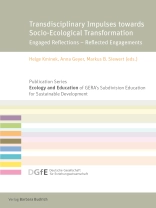Bildung für nachhaltige Entwicklung soll die Menschen zu zukunftsfähigem Denken und Handeln befähigen – angesichts von Herausforderungen wie Klimawandel, Umweltzerstörung, Verlust der biologischen Vielfalt, Armut und Ungleichheit. Wie können unterschiedliche Disziplinen diese Aufgabe wahrnehmen? In diesem Band werden wissenschaftlich interdisziplinäre Beiträge aus der Philosophie, den Sozial- und Erziehungswissenschaften um transdisziplinäre Beiträge aus Praxisfeldern (z. B Museumspädagogik, Journalismus) ergänzt. Die aktuellen Beiträge geben Reflexionsanstöße und eröffnen Denkräume, um der Komplexität der Aufgabe der sozial-ökologischen Transformation gerecht zu werden.
Table des matières
Helge Kminek, Anna Geyer and Markus B. Siewert: Engaged Reflections – Reflected Engagement Introduction to the Topic and the Contributions <br>Jonathan Maskit: Urban Mobility – Urban Discovery: A Phenomenological Aesthetics for Urban Environments <br>Diana Hummel: Population Dynamics and Sustainable Development in the Anthropocene <br>Christian Stache: Education for Sustainability as a Critical Theory of the Social Relationship to Nature <br>Helge Kminek: A Contribution from the Philosophy of Science for Education for Sustainable Development <br>Beer Albers: Autonomy and Second Nature: A Hegelian Account of Education for Sustainable Development <br>Franz Rauch, Günther Pfaffenwimmer and Renate Hübner: Networking for Sustainability in Education <br>Leon Fuchs, Christina Höfling and Lena Theiler: ESD in the Museum: The Project Bio Kompass. A Practical View from the Senckenberg Natural History Museum Frankfurt <br>Anna Geyer: Sustainable Development at Institutions of Higher Education – The Example of Goethe University <br>Georg Ehring: Reports on Climate Change <br>List of Authors <br>Index
<br>
A propos de l’auteur
Dr. Helge Kminek is a postdoctoral researcher at the Institute for General Educational Science at Goethe University Frankfurt, Germany. Anna Geyer, B.A., is a student of political science and economics at Goethe University Frankfurt, Germany. Dr. Markus B. Siewert is a postdoctoral researcher at the Munich School of Public Policy and the School of Social Sciences and Technology at the Technical University of Munich, Germany.












